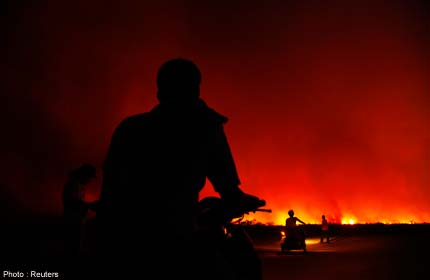
Jakarta - Even as government agencies pleaded that they needed on-the-ground checks before naming suspects behind the haze-producing burning, two non-governmental organisations (NGOs) took on the task of mapping satellite images of hot spots onto land concession maps to identify the companies whose lands were burning.
Over the past two days, the World Resources Institute (WRI) and Greenpeace have gone public with these names.
Several companies, however, have said the concession maps are partially inaccurate.
The NGOs agree.
Dr Nigel Sizer, director of WRI's Global Forest Initiative, told The Sunday Times that these discrepancies only show the need for all parties to be more transparent on the issue.
"If companies are saying the data is wrong, they should step up and put their maps on the table, and we'd be able to compare the discrepancy," he said.

"If you want to criticise the data, more accurate and updated data has to be available."
Observers say part of the problem is that discrepancies abound in such items as concession maps and permits, so information at the district level may differ from that in Jakarta.
| Haze affects Malaysia Click on thumbnail to view (Photos: SwitchUp.tv, The Star) |
||||
 |
 |
 |
 |
 |
 |
 |
 |
 |
 |
 |
 |
 |
 |
 |
 |
 |
 |
 |
 |
 |
 |
 |
 |
|
| For more photos, click here. | ||||
| Emergency declared in Malaysia as API surpasses 750 Click on thumbnail to view (Photos: AFP, Reuters ) |
||||
 |
 |
 |
 |
 |
 |
 |
 |
 |
 |
 |
 |
 |
 |
 |
| Smoke from hotspots blanket Riau province Click on thumbnail to view (Photos: Hang Nadim Meteorological Station, ST, Reuters, AFP, Sarawak Conservation Alliance for Natural Environment) |
||||
 |
 |
 |
 |
 |
 |
 |
 |
 |
 |
 |
 |
 |
 |
 |
 |
 |
 |
 |
 |
Fixing this, Dr Sizer said, is a key aspect of preventing fires of this kind in future.
Then there are cases in which even companies that are involved may not be aware of.
For instance, hot spots have been detected on land listed as PT Surya Dumai Agrindo's, which is linked to First Resources.
First Resources has clarified this permit expired "many years ago and was never developed by the group".
However, more up-to-date information WRI has seen shows the company still listed as a palm oil concession in government data.
As Greenpeace South-east Asia's forest campaigner Yuyun Indradi noted: "The lack of government transparency makes it very hard for independent monitoring: concession maps are incomplete, data is lacking and we clearly have weak enforcement of laws."

Get a copy of The Straits Times or go to straitstimes.com for more stories.


